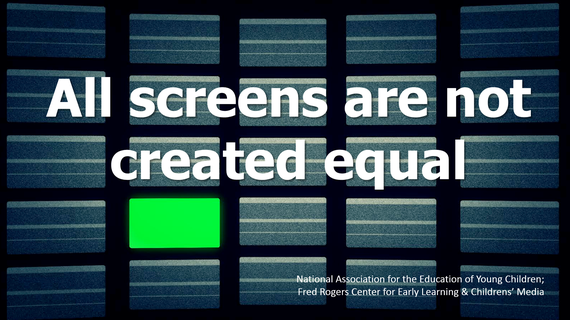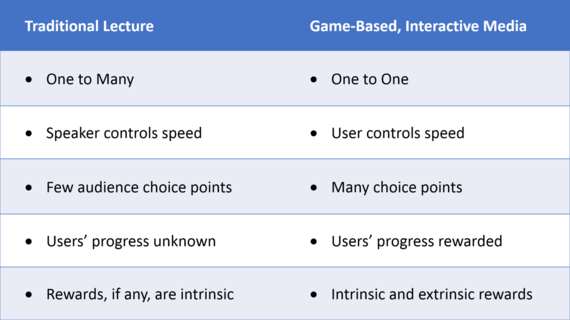
My youngest daughter, now 5, first got a hold of my iPhone at an age younger than I am willing to admit. Then she discovered the iPad. And by the time she was old enough to see over my desk onto my computer, she simply called it an "i-Puter."
It's been that way in our house ever since: iPhone, iPad, iPuter. (Take note, Apple!)
My daughter is a true digital native: She was born into a connected world and will never fully understand life without touch screens and tablets.
In trying to figure out if her attraction to the smartphone was "normal" (i.e., how bad of a parent am I?), I learned that her generation is one that, on average, spends 168 more hours with digital media each year than they do in school. For 8-18 year olds, their time spent with media is more than twice that spent in school.
All of this media exposure in my daughter's life has caused me to question its impact -- on her attention span, on her memory, on her motivation.
My first Google search on the topic showed me some scary implications. The UK Telegraph has called digital natives "The Facebook Generation" and declared a potential "National Attention Deficit Disorder." A national disorder! Similarly, The New York Times and Harvard University have said that children of this generation may have brains that are "wired differently." They went on to say that there may be so much stimuli in media today that "reality becomes boring."
But is reality becoming boring, or has day-to-day reality always been just a little bit monotonous? Groundhog Day, anyone? What kid (or even adult) for generations hasn't sought escape in books, plays and even their own daydreams?
Not All Screens Are Created Equal

I believe that we can't lump all real-world experiences into a singularly positive or negative impact on our children, nor can we lump all media together as either singularly good or bad. This is particularly true when considering the impact of interactive media on cognitive development.
Many people do not know this, but Fred Rogers of the beloved "Mister Rogers' Neighborhood" actually went into television because he "hated it so." He felt that there ought to be some way to make this captivating technology a positive influence in the lives of children.
Fred Rogers is not alone in this sentiment. I share it too. And similar to Mr. Rogers, I joined an Ed Tech company because I felt there had to be a way to put all of this technology to positive use in the lives of children.
And there is now a growing body of evidence that suggests media and technology can actually help -- not hurt -- cognitive ability and rebuild attention span. For example, Nature magazine has a cover article citing research by the University of California San Francisco that shows a video game can decrease the signs of aging.
The Atlantic commented on the study by adding, "It may be hard to accept the idea that relatively use of an immersive, even fun, video game will help in the war on disruption."
Can you imagine that? Being immersed in something we find riveting actually helps us stay on task and focused!
Another report by doctors in Italy suggests that action video games can help dyslexic children read better. Dyslexia is often thought to be caused by a low working memory, and repetition in an interactive environment can help develop that working memory to allow for greater retention in reading.
The company I work for, Istation, also has research showing that 1st-5th graders who use the digital interactive reading curriculum experience 60-80 percent greater growth in reading scores compared to students who do not use the program.
What Media is Good Media?
What is it about game-based, personalized media that might make it disproportionately productive for our children? As an example, let's look at interactive media versus a traditional classroom lecture. While potentially an oversimplification, game-based media can hold several advantages:
Interactive media allows for a personalized experience. If done well, the user can make choices within the program that actually impact what happens next -- effectively, choose your own adventure. Good media has an element of "cause and effect" in it, which allows the user to see the consequences of his or her decisions. Ideally, good progress is then rewarded, even if it is as simple as a star shooting across the screen.
Especially with the summer months approaching, I know my daughter is bound to ask to play on my phone or try to get me to download a particular app. Before I do so, I will ask myself the following questions:
- Is the experience personalized?
By rating the media for my daughter based on those questions, and favoring experiences where I can answer "yes" to all of them, I am taking at least a small step toward making better media choices for her and her development.
If you are wondering whether your child is need of a digital detox, remember that not all screens are created equal. An interactive, game-based environment that is focused on key cognitive skills can actually be a great addition to your kid's playtime routine.
So don't lock up those iPads just yet. They might help keep reading and math skills alive and well during the summer months.
